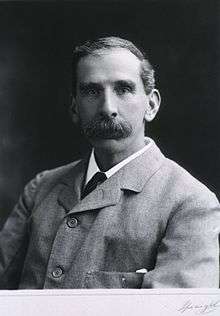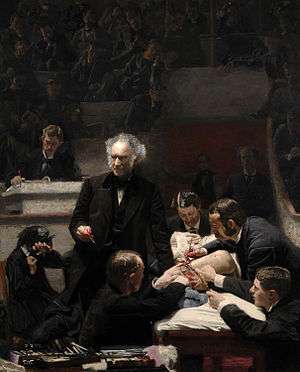Surgeon
In medicine, a surgeon is a specialist in surgery. Surgery is a broad category of invasive medical treatment that involves the cutting of a body, either that of a human or another animal, for a specific reason such as the removal of diseased tissue or to repair a tear or breakage in the body. Surgeons may be physicians, podiatrists, dentists, or veterinarians.
History
In history, surgery was mostly associated with barber-surgeons who also used their hair-cutting tools to undertake surgical procedures, often at the battlefield and also for their royal paymasters. With advances in medicine and physiology, the professions of barbers and surgeons diverged; by the 19th century barber-surgeons had virtually disappeared, and surgeons were almost invariably qualified doctors who had specialised in surgery. Surgeon continued, however, to be used as the title for military medical officers until the end of the 19th century, and the title of Surgeon General continues to exist for both senior military medical officers and senior government public health officers.
Titles in the Commonwealth
In 1950, the Royal College of Surgeons of England (RCS) in London began to offer surgeons a formal status via RCS membership. The title Mister became a badge of honour, and today, in many Commonwealth countries, a qualified doctor who, after at least four years' training, obtains a surgical qualification (formerly Fellow of the Royal College of Surgeons, but now also Member of the Royal College of Surgeons or a number of other diplomas) is given the honour of being allowed to revert to calling themselves Mr, Miss, Mrs or Ms in the course of their professional practice, but this time the meaning is different. It is sometimes assumed that the change of title implies consultant status (and some mistakenly think non-surgical consultants are Mr too), but the length of postgraduate medical training outside North America is such that a qualified surgeon may be years away from obtaining such a post: many doctors used to obtain these qualifications in the senior house officer grade, and remain in that grade when they began sub-specialty training. The distinction of Mr (etc.) is also used by surgeons in the Republic of Ireland, Australia, Barbados, New Zealand, South Africa, Zimbabwe, and some other Commonwealth countries.[1]
Military titles
In many English-speaking countries the military title of surgeon is applied to any medical practitioner, due to the historical evolution of the term.
Specialties
- Cardiac surgery (in the USA considered part of cardiothoracic surgery)
- Colon and rectal surgery
- Dental surgery
- Transplant surgery
- Upper gastrointestinal surgery
- Vascular surgery
- Craniofacial surgery
- Neurological surgery
- Oral and maxillofacial surgery
- Obstetrics and gynaecology
- Orthopedic surgery
- Ophthalmology
- Otorhinolaryngology
- Pediatric surgery
- Plastic surgery
- Podiatric surgery
- Surgical oncology
- Trauma surgery
- Thoracic surgery (in the USA considered part of cardiothoracic surgery)
- Urology
- Veterinary surgery
- General Surgery
Some physicians who are general practitioners or specialists in family medicine or emergency medicine may perform limited ranges of minor, common, or emergency surgery. Anesthesia often accompanies surgery, and anesthesiologists and nurse anesthetists may oversee this aspect of surgery. Surgeon's assistant, surgical nurses, surgical technologists and operating department practitioners are trained professionals who support surgeons.
Pioneer surgeons


- Sushruta (the first to document an operation of open rhinoplasty[2])
- Abu al-Qasim al-Zahrawi (considered the father of modern surgery,[3])
- Charles Kelman (Invented phacoemulsification, the technique of modern cataract surgery)
- William Stewart Halsted (initiated surgical residency training in U.S., pioneer in many fields)
- Alfred Blalock (first modern day successful open heart surgery in 1944)
- C. Walton Lillehei (labeled "Father of modern day open heart surgery")
- Christiaan Barnard (cardiac surgery, first heart transplantation)
- Victor Chang Australian pioneer of heart transplantation
- John Hunter (Scottish, viewed as the father of modern surgery, performed hundreds of dissections, served as the model for Dr. Jekyll.)
- Sir Victor Horsley (neurosurgery)
- Lars Leksell (neurosurgery, inventor of radiosurgery)
- Joseph Lister (discoverer of surgical sepsis, Listerine named in his honour)
- Harvey Cushing (pioneer, and often considered the father of, modern neurosurgery)
- Paul Tessier (French Surgeon, Father of Craniofacial surgery)
- Gholam A. Peyman (Inventor of LASIK,[4])
- Nikolay Pirogov (the founder of field surgery)
- Valery Shumakov (pioneer of artificial organs implantation)
- Svyatoslav Fyodorov (creator of radial keratotomy)
- Gazi Yasargil (Turkish neurosurgeon, founder of microneurosurgery)
- Rene Favaloro (first surgeon to perform bypass surgery)
- Michael R. Harrison (pioneer of fetal surgery)
- Michael DeBakey (educator and innovator in the field of cardiac surgery)
- Fidel Pagés (pioneer of epidural anesthesia)
Organizations and fellowships
| Wikimedia Commons has media related to Surgeons. |
References
- ↑ "Patients: The Surgical Team: Qualifications of a surgeon". Royal College of Surgeons of England. Retrieved 13 June 2015.
- ↑ Ira D. Papel, John Frodel, Facial Plastic and Reconstructive Surgery
- ↑ A. Martin-Araguz, C. Bustamante-Martinez, Ajo V. Fernandez-Armayor, J. M. Moreno-Martinez (2002)
- ↑ US Patent 4,840,175, "METHOD FOR MODIFYING CORNEAL CURVATURE", granted June 20, 1989
|
